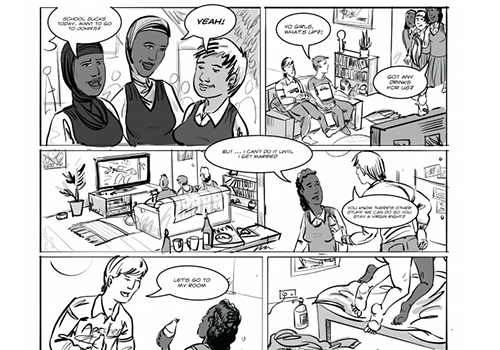Sexual Health and Relationships Education (SHARE) – Educational Tool
We spoke to young people to find out how they learn about sexual health. Based on this research, we developed comics designed to facilitate discussions about sexual health. The comics are available online for teachers or anyone working with young people. The comics come with Facilitators Guides, Fact Sheets and information about relevant services available.
Many people, including teachers, find it hard to start a discussion about sexual health. We found that using comics and asking young people to talk about the scenario in the comic, is a great way to get the discussion started.
To help facilitators who are unsure or uncomfortable with the content of the comics, our Facilitators Guides offer tips and ideas about some of the issues they can explore in each comic.
The Fact Sheets offer more detailed information about the key themes in the comics, and along with the Services Available, can be easily printed or accessed for the young people to use at their leisure.
To learn more about this project please contact us at enquiries@ceh.org.au
Related Information
CEH is all grown up! 30th birthday celebrations.
On 17th September 2024, CEH celebrated its 30th anniversary with staff and friends from organisations that have worked with us over the years on projects, training and partnerships. A great opportunity for all of us at CEH to reconnect and catch up on what’s happening in the sector.
Connecting with communities using Health Literacy principles
Plain language is essential for effective communication. When health information is presented in plain language, it is easier for people to understand. This is particularly important when dealing with diverse communities where English may not be the first language for many residents.
Co-design: what, why and how?
We know that collaboration is an important step in engaging diverse communities in services, particularly those that face certain barriers such as linguistic and cultural differences, lack of awareness of services, and limited access to information. So, how can we collaborate with these communities? Read on for our thoughts.
The Arthur Kleinman Explanatory Model
This model was first proposed by Arthur Kleinman, who developed a set of eight questions to ask a client to learn more about their explanatory model to provide better patient-centered care.

Let us inform you about our EVENTS & NEWS?

